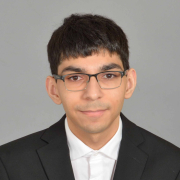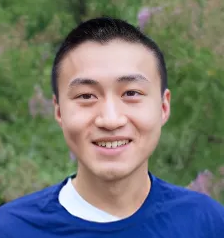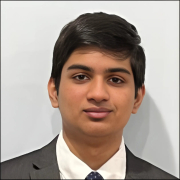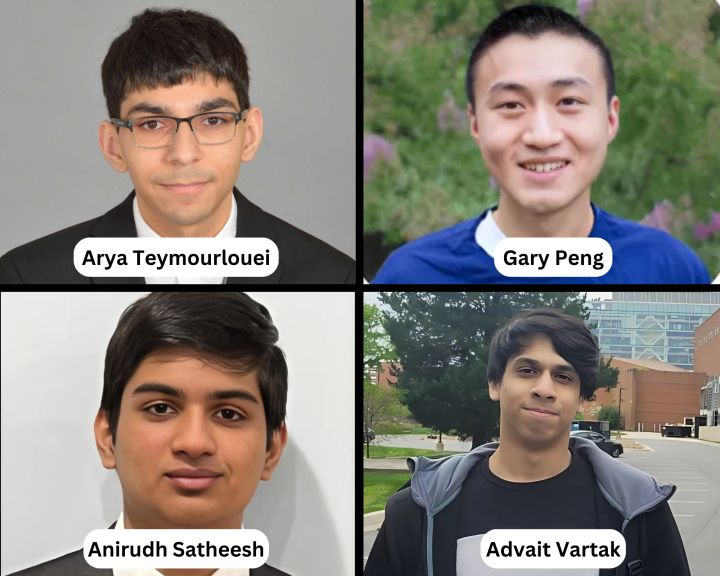Four UMD Students Recognized by CRA for Outstanding Undergraduate Research
Four undergraduate students from the University of Maryland’s Department of Computer Science have received recognition from the 2024-2025 Computing Research Association’s (CRA) Outstanding Undergraduate Researcher Award. Arya Teymourlouei (B.S. ’25, computer science) was named a runner-up, while Gary Peng (B.S. ’26, computer science; B.S. ’26, mathematics), Anirudh Satheesh (B.S. ’26, computer science; B.S. ’26, mathematics) and Advait Vartak (B.S. ’26, computer science) received honorable mentions for their research contributions.
This year, Sandia National Laboratories and Lawrence Berkeley National Laboratory (LBNL) sponsored the CRA Undergraduate Researcher Award. The award recognizes North American students who demonstrate exceptional research potential in computing. It emphasizes innovation and impact in research, academic excellence and service involvement.
Arya Teymourlouei
 Teymourlouei conducts research in UMD’s Neuromotor Control and Learning Laboratory (NMCL). His work focuses on computational modeling, neuroinformatics, artificial intelligence and machine learning under Computer Science Associate Professor Jim Purtilo, Professor Emeritus James Reggia and Associate Professor of Kinesiology Rodolphe Gentili.
Teymourlouei conducts research in UMD’s Neuromotor Control and Learning Laboratory (NMCL). His work focuses on computational modeling, neuroinformatics, artificial intelligence and machine learning under Computer Science Associate Professor Jim Purtilo, Professor Emeritus James Reggia and Associate Professor of Kinesiology Rodolphe Gentili.
“The focus of my current work is to develop novel methods for robust multivariate EEG time series analysis with the goal of accurately and rapidly measuring mental workload as individuals carry out tasks,” Teymourlouei said. “This supports the development of passive brain-computer interface systems and improves our understanding of the neural mechanisms underlying human cognitive-motor processes.”
Teymourlouei expressed gratitude for the recognition and the support he has received.
“It is an honor to represent UMD, the Department of Computer Science and the Teymourlouei name with this recognition,” he said. “This would not have been possible without the support of my mentors, instructors, family and friends.”
Looking ahead, he plans to model human neural activity by studying the brain as a complex, chaotic system.
“I plan to work on constructing novel models of human neural activity,” Teymourlouei said. “I’m particularly interested in modeling the brain as a complex, chaotic system that shifts between deterministic, predictable states and those of randomness and high unpredictability, known as the ‘edge of chaos.’ This research could enhance our understanding of higher-order cognitive-motor processes, such as attention, planning and problem-solving and inspire novel approaches to AI systems.”
Gary Peng
 Peng's research focuses on the bilateral trade problem in economics, advised by Jack and Rita G. Minker Professor of Computer Science Mohammad Hajiaghayi and graduate student Suho Shin. His research examines how self-interested brokers affect trade efficiency.
Peng's research focuses on the bilateral trade problem in economics, advised by Jack and Rita G. Minker Professor of Computer Science Mohammad Hajiaghayi and graduate student Suho Shin. His research examines how self-interested brokers affect trade efficiency.
“In this problem, a seller wishes to sell an item to a buyer, and a third-party broker designs a mechanism to determine whether the item should be transferred and at what price,” Peng explained. “We’ve explored how a self-interested broker, motivated by profit, compromises the efficiency of the trade.”
The recognition of his research marks a notable point in Peng's academic work, emphasizing the progress of his research in the field.
“This award has encouraged me to persevere as a researcher, even if it means small, incremental progress each day,” he said. “I’m also grateful for the support of my family, friends, professors and mentors.”
In the future, Peng plans to explore ways to limit the broker’s impact on trade efficiency.
“One major open question is whether the self-interested broker can be guaranteed to compromise at most a fixed fraction of the optimal efficiency,” Peng said. “We’ve shown this holds when the buyer’s and seller’s valuations are drawn from probability distributions with monotone hazard rates, but it remains unclear if it applies to general probability distributions.”
Anirudh Satheesh
 Satheesh’s work focuses on machine learning and is advised by Associate Professor of Computer Science Furong Huang, former Associate Professor John Dickerson and Arizona State University Assistant Professor of Computer Science Hua Wei.
Satheesh’s work focuses on machine learning and is advised by Associate Professor of Computer Science Furong Huang, former Associate Professor John Dickerson and Arizona State University Assistant Professor of Computer Science Hua Wei.
“My main research is on machine unlearning for large language models and robotic behavior generation models,” Satheesh said. “I’m also developing benchmarks for supply chain optimization using multi-agent reinforcement learning and exploring synthetic traffic signal control environments to improve traffic policies.”
Satheesh expressed gratitude for the recognition and acknowledged the support he received throughout his research journey.
“I’m very honored to receive an honorable mention for this award,” Satheesh said. “It motivates me to continue pursuing impactful research. I would like to thank my advisors, especially Professor Huang, for providing me with opportunities and guidance along the way.”
He plans to extend his work on machine unlearning to vision-language-action models and incorporate scene-level spatial-temporal information into decision-making systems.
“I want to extend my work on machine unlearning to large, multi-modal sequential decision-making models, such as Vision-Language-Action models,” Satheesh said. “I’m also exploring ways to incorporate scene-level spatial-temporal information into VLAs and develop efficient communication networks for multi-agent settings using LLMs.”
Advait Vartak
 Vartak's research focuses on human-computer interaction with an emphasis on sustainability. Advised by Assistant Professor of Computer Science Huaishu Peng and graduate student Zeyu Yan, Vartak has contributed to research specifically regarding sustainability in electronics.
Vartak's research focuses on human-computer interaction with an emphasis on sustainability. Advised by Assistant Professor of Computer Science Huaishu Peng and graduate student Zeyu Yan, Vartak has contributed to research specifically regarding sustainability in electronics.
“I’ve been conducting research in the field of human-computer interaction,” Vartak said. “This past year, I worked on a project centered on reusing circuit boards during the prototyping process, where I was responsible for developing the software to facilitate this reuse.”
Vartak shared his gratitude for the recognition.
“It still feels a little surreal,” Vartak expressed. “I hope to honor this achievement by continuing to work hard.”
Vartak highlighted his ongoing work and eagerness to explore new areas within human-computer interaction.
“I’m currently working on a project similar to my previous one,” Vartak said. “I also want to explore other areas of human-computer interaction, as it’s a diverse field with many opportunities to learn and contribute to interesting research.”
—Story by Samuel Malede Zewdu, CS Communications
The Department welcomes comments, suggestions and corrections. Send email to editor [-at-] cs [dot] umd [dot] edu.
